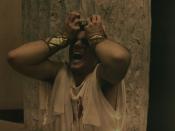Fate Or Free Will?
Is man free to mold his own destiny, or is he just a mere object in the universe of fate? Throughout life many of us may be faced with the question, was it my fate or was it my free will? Greek philosopher, Aristotle said, "Man is free to strive to become all that is in him to become, or to become less. The ultimate choice lies within man" Whether man believes that fate controls his destiny or destiny controls his fate, his character is essentially what controls it. In Sophocles play, Oedipus the King, we are introduced to Oedipus, the protagonist, whose actions and fate are determined by him and ultimately lead to his downfall. Although the Oracle Apollo has predicted what will ultimately become of Oedipus, he does not control Oedipus' life and actions. Oedipus determines his conduct by being the type of man he is and takes steps under free will.
Oedipus' decision to hear Creon's message with others in attendance, his promise to avenge the king's murder and his drive to learn the truth were all actions driven by his character and conducted under free will. His actions in the play will show that it was free will, not fate that lead to his discovery of his murder of his father and marriage to his mother.
Oedipus' first action was influenced by his trust and openness of his people. After Creon returned from Delphi with news from Apollo on how to stop the plague and put an end to the suffering, he suggested that he speak to Oedipus in private. Creon tells Oedipus:
"If you want my report in the presence of these... (Pointing to the priest while drawing Oedipus to the palace) I'm ready now, or we might go inside."...


